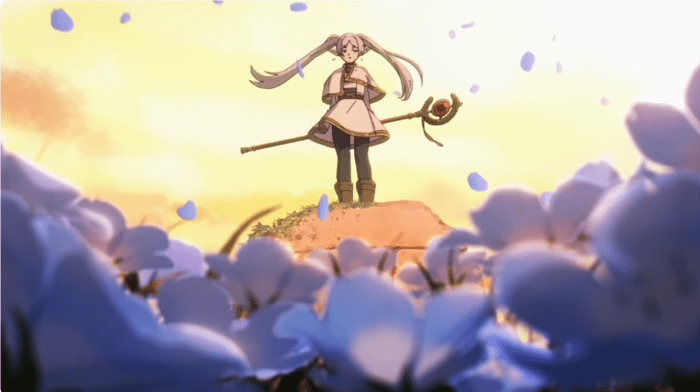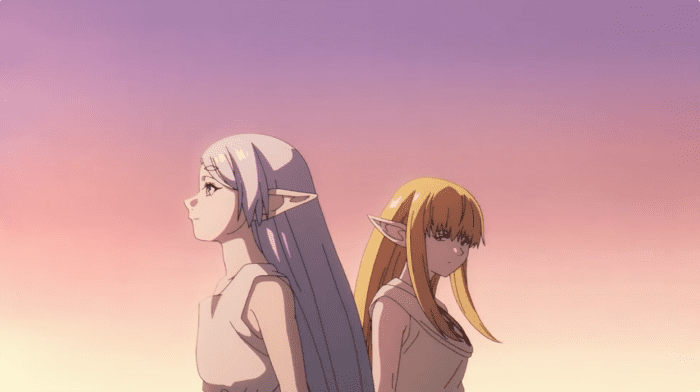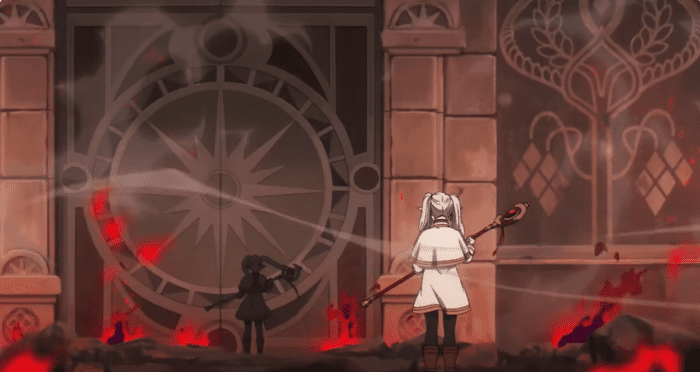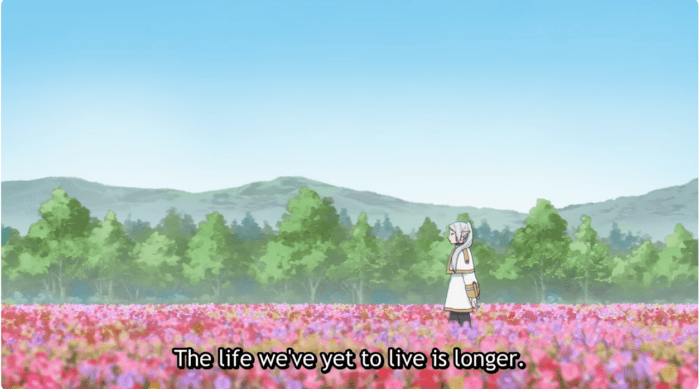Frieren: Beyond Journey’s End taught me about life, death, memory, and impermanence. The show’s lessons were numerous: some were direct, some were subtle, but regardless of how they were conveyed, they all felt meaningful. Frieren also reminded me to slow down and listen to the world around me. It reminded me that any act of helping, no matter how small, is still significant. And it reminded me that we need to live deeply and fully with what time we are given, because no one is truly immortal.
Initially, I was drawn to Frieren: Beyond Journey’s End because of its atypical plot: unlike most adventure stories, the show actually begins after the big adventure is over. We meet the cast after they have traveled and fought together for 10 years, and, because the battle with the Demon King is already won, we enter a quiet world in an era of (relative) peace. Then, 50 years pass, and when the heroes reunite to watch a meteor shower, they are, understandably, quite old—except, of course, for Frieren, the (ostensibly) immortal elf. Not long after their reunion, Himmel, one of the heroes, dies, and the remaining party members—Frieren, Eisen, and Heiter—come together to mourn him.
At the funeral, Frieren appears to be unaffected by Himmel’s death until the dirt starts piling up on his coffin lid. Suddenly, she is flooded with memories, and she realizes that she overlooked their entire relationship as it unfolded. She saw Himmel only as a fellow adventurer, someone she traveled with for (a mere) 10 years. As she remembers him—and his obvious care and love for her—she realizes just how much she missed and begins to sob. In the event of Himmel’s death, Frieren resolves to learn more about the lives of human beings, which is where her journey really begins. (Later, she resolves to reunite with Himmel in Aureole, the place where souls gather.)

This is the first lesson I learned from Frieren: Beyond Journey’s End: when our loved ones die, we are forced to mourn not only the loss of the person, but also the moments we shared with them that we simply were not present for. These moments cannot be recreated, relived, or reclaimed, but they can be honored, and as Frieren travels about the world, she pays homage to Himmel (and others) on numerous occasions. Frieren’s memories of her departed friends and loved ones remain relevant throughout the season, and they often reemerge to punctuate pivotal moments in her story. They provide Frieren with strength, wisdom, and joy as her pilgrimage to Aureole unfolds.
Memory plays an interesting role in Frieren. At first, its primary function is to link past to present, usually to amplify (and clarify) the significance of the present moment. But as the season progresses, it also makes you question how memory and the act of remembering would operate in a seemingly immortal mind. What would thousands of years of experiences and countless encounters with other beings—especially short-lived, mortal beings—do to the mind? Serie, the other elf mage, who plays a kind of dark(ish) counterpart to Frieren, shows us one possibility. Toward the end of the season, Serie tells Frieren that she remembers all her previous students’ names and favorite spells, but she doesn’t understand why she remembers them. For all her centuries of life—to say nothing of her power, knowledge, and foresight—she lacks basic insight into her own emotions, relationships, and memories. This is the first indication that even immortality has its limitations.

Serie is also a hoarder: she hoards grimoires, spells, and magical knowledge, which she dangles in front of other mages like a genie. But for me, all this hoarding is indicative of how stuck she is. Even in the early opening shots, we always see Serie in the same hall, in the same position, in the same chair. In one sense, she is the embodiment of immortality as a metaphor for unspontaneous, obsessive repetition. She can sense magic and other beings across vast distances but she herself is quite distant from the people around her. She resides in a hall that is as grand as it is silent. Her constant companions are stacks of lifeless tomes. Serie is psychologically stuck, perhaps as a result of her own immortality (toward the end of the season, Freiren even calls her immature). The lesson here is that psychological development is not entirely dependent on time or experience, because, as Serie demonstrates, even immortal beings can be developmentally arrested. We may have access to limitless knowledge, power, and resources, but if we hide from the world, we simply cannot grow.
In contrast to Serie, Frieren understands the importance of both humility and collaboration with others. This is evidenced by her acknowledgement that she could not have defeated the Demon King without the help of Himmel, Heiter, and Eisen. She also understands the importance of mentorship and of relationships more generally, which we see time and time again with Fern and Stark (and with Sein, Kanne, Lawine, and others).
Another striking aspect of Frieren’s character is how powerful she is yet how unattached she is to her own power. Unlike many characters in the series, she does not care about being perceived as a powerful being. Frieren only uses her power when she needs to, and I think that masking her own mana has more significance than merely tricking demons (or other mages). Frieren thoughtfully conceals the depth of her power and skill because she only uses them when the situation calls for it. She has no desire for fame or notoriety, nor does she ever use her abilities for attention, praise, or recognition. She does not even care if she passes the mage exam, because she knows Fern will pass, which is all that matters to her anyway. Frieren’s trust in Fern, and her pride in Fern’s achievements, also says a lot about her own humility, as well as her ability to appreciate the accomplishments of others. This is especially significant, considering she is surrounded by mortal beings whose lifespans are like the blink of an eye compared to hers. But, as the show reminds us on numerous occasions, the notoriety and/or the duration of a life do not ultimately determine its significance.

Unquestionably, one of the most important moments in the season is Frieren’s confrontation with her own shadow-replica. Although this battle can represent many things, I think it depicts Frieren’s confrontation with the possibility, or the inevitability, of her own death. Before the battle, Frieren and the other mages consult with one another until it is determined that the best option is for Frieren and Fern to face the shadowy replica of Frieren by themselves. In the first part of the battle, Frieren gleefully remembers a comment (or prediction?) made by Serie, in which she suggested that if Frieren died in battle, she would either be killed by the Demon King or a human mage. The fact that Fern, a human mage, was supporting her in killing a dark replica of herself is probably why she was smiling so much as she remembered this conversation.
This shadow confrontation, coupled with the memory of Serie’s comment, provides yet another key to Frieren’s story: if Frieren continues to live in the world of humans, she is essentially becoming more human, and more vulnerable, which opens her up to the possibility of dying. Unlike Serie, who stays (hides) safely within the confines of her little kingdom, Frieren risks everything to honor her fallen comrades, learn more about human beings, and care for others as she travels the world. By facing her own shadow head on, Frieren comes out of the battle more psychologically whole than she was before. In simpler terms, she comes out of the battle feeling more like herself. On a larger scale, this battle could, perhaps, presage the era of human domination in their world, but elf and mage still fought side by side, so perhaps the future is not so clear cut.
The aftermath of this battle also shows us how much Frieren has changed since the first episode, when she vowed to learn more about human beings. In the final episodes of the season, Frieren speaks and acts with clarity and ease, so much so that she deescalates a potentially fatal encounter with one of Serie’s mages by using words rather than magic. At the end of the first season, Frieren has obviously grown as a person and has, perhaps, become a little more human in the process. And here is another lesson: we are all, human or elf or otherwise, learning how to live in the world. We’re all learning how to be ourselves, and sometimes we’re awkward and immature; sometimes we don’t understand why people are doing what they are doing; sometimes we feel utterly out of place and confused. Initially, I saw this as Frieren’s condition, not mine, but by the end of the season, I realized that Frieren is all of us. We behave as if we are immortal, but really, we’re all just bumbling around, trying to learn how to be human before our own show comes to an end. And that is, perhaps, the most crucial lesson of all.


